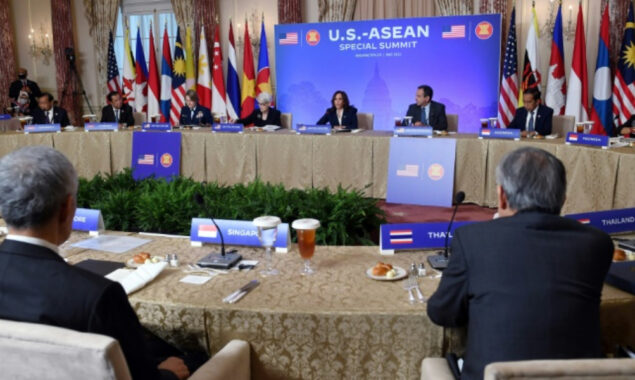
US tells ASEAN leaders committed ‘for generations’
President Joe Biden met with regional leaders for the first time in Washington on Friday, promising a long-term commitment to Southeast Asia in the face of China’s expanding strength.
Biden revealed plans for the first full US ambassador to the Association of Southeast Asian Nations in more than five years, as well as $150 million in new programs.
“What we’re all wanting is a region that is free and open, stable and wealthy, resilient and secure,” Biden told ASEAN leaders a day after kicking off the two-day summit with a White House dinner of poached chicken, ravioli, and vanilla ice cream.
Vice President Kamala Harris, meeting ASEAN leaders for a working lunch, said the administration “recognizes the vital strategic importance of your region.”
“As an Indo-Pacific nation, the United States will be present and continue to be engaged in Southeast Asia for generations to come,” she said.
Biden announced that he would propose Yohannes Abraham, the National Security Council’s chief of staff and a crucial adviser during the presidential transition, as ambassador to ASEAN’s secretariat in Jakarta.
Since Barack Obama’s presidency, the US has not had a Senate-confirmed ambassador to ASEAN, with Donald Trump only appointing an envoy after losing the 2020 election.
– In contrast to China – After months of focusing on opposing Russia’s invasion of Ukraine, the Biden administration hopes to display a consistent interest in Southeast Asia.
Biden stated before he started office that his primary foreign policy issue would be the global struggle with China, which has eclipsed the US as Southeast Asia’s biggest commercial partner and has become more muscular in regional territorial disputes.
Richard Fontaine, chief executive officer of the Center for a New American Security, said Biden’s summit pledges were bound to bring “uncomfortable comparisons.”
Chinese President Xi Jinping at his own virtual summit with ASEAN last year announced $1.5 billion in Covid aid over three years, while the United States is preparing a $40 billion package for embattled Ukraine.
“To complicate matters further, the United States lacks a trade policy in Asia, the region where it matters most,” Fontaine said.
Biden is expected to announce a broad “Indo-Pacific Economic Framework” when he travels next week to Japan and South Korea.
The latest package for ASEAN, which follows $100 million announced by Biden at a virtual summit last year, includes initiatives to back green energy and maritime security, with the US Coast Guard to deploy a cutter in Southeast Asia to help fight illegal fishing and other crime.
– Isolating Russia –
The Biden administration has made some progress in isolating Russia in Southeast Asia, with all ten ASEAN members voting in favor of or abstaining from a UN General Assembly resolution condemning Russia.
Following the summit, the US and ASEAN issued a joint statement in which they “reaffirm our respect for Ukraine’s sovereignty, political independence, and territorial integrity.”
“We realize that if the war continues, all of us will suffer,” Indonesian Foreign Minister Retno Marsudi told Secretary of State Antony Blinken.
Despite US requests to ban Russian President Vladimir Putin, Indonesia has welcomed him to the Group of 20 meeting in November and has announced it will also welcome Ukrainian President Volodymyr Zelensky.
Conspicuously not invited to Washington was the junta in Myanmar, which overthrew Aung San Suu Kyi’s elected government last year, triggering a slew of US sanctions.
Despite criticism that little progress has been made, the joint statement reaffirmed support for ASEAN leaders’ so-called “Five-Point Consensus” agreed in Jakarta in April 2021, which calls for a cease of violence and “constructive discussion.”
On the fringes of the meeting, Deputy Secretary of State Wendy Sherman met with members of the self-styled government in exile, prompting criticism from the junta.
“In the Asia-Pacific region, China is a powerful country. Our country is dealing with and having relations with powerful China and India,” military spokesman Zaw Min Tun told AFP.
Read More News On
Catch all the International News, Breaking News Event and Latest News Updates on The BOL News
Download The BOL News App to get the Daily News Update & Follow us on Google News.




